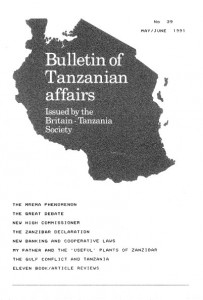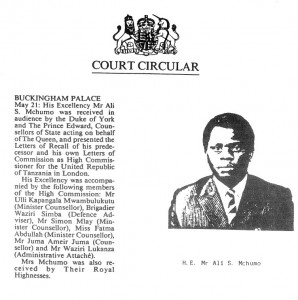A SPARKLING ADDRESS
In what NEW AFRICAN (July 1991) described as a ‘sparkling address’ Mwalimu Julius Nyerere, who was speaking as Co-chairman of a recent African Leadership Forum in Kampala, was quoted as having said that many African leaders had made serious mistakes in the past. “We thought that we could develop without involving the people” he said. He added however, that there was no need to be hard on ourselves. “Before independence we were thrown into jail for trying to form political parties – so what experience did we have of organising on a national level? Instead we tried to do what the Europeans did. We tried to build socialism without socialists; we tried to create capitalism without entrepreneurs! But we tried. The West should pay us reparations for all the harm some of their ideas have done to us” he said amid laughter.
A LONG WAIT
A recent issue of WORLD BANK NEWS, in an article headed ‘Long Waits for Telephone Service Put Some Countries’ Development Efforts on Hold’, gave some rather extraordinary figures about the length of waiting lists for the installation of telephones in various countries in 1988. The waiting time in Tanzania was said to be 10.9 years! But this was by no means the worst case. In Ghana it was said to be 30 years, in Argentina 21.9 years, in Jamaica 22.3 years and in Egypt 27.1 years. The source of the information was said to be ITU, Pyramid Research Inc.
ZANZIBAR FINDS A NEW SPICE OF LIFE
Under this heading the July issue of NEW AFRICAN stated that some 10,000 people, mostly women, were now making a living in Zanzibar from a new cash crop – seaweed. Some women were making up to US$100 per month. About 500 tonnes of dried seaweed have been produced in the past year worth US$150,000.
Industrialised countries use seaweed in pharmaceuticals, textiles, rubber, adhesives and various foods.
One Zanzibari, Mr Mwatum Ali, was quoted as having said that he had begun seaweed farming six months earlier and had already managed to buy a radio and seven pairs of shoes.
PRAISE FOR TANZANIA’S PROGRESS IN IMPLEMENTING ECONOMIC REFORMS WORLD BANK NEWS (June 27, 1991) stated that the Consultative Group for Tanzania comprising 14 aid donor organisations and nine international agencies had praised, at a meeting the day before in Paris, Tanzania’s progress in implementing economic reforms. There had been increased agricultural production, growth in the manufacturing sector, a larger volume of exports of non-traditional goods and an average growth rate of up to 5% during the past five years. Tanzania’s economic development and adjustment programmes would receive up to US$ 980 million in donor support in 1991 and 1992.
But AFRICA EVENTS (August 1991) in an article commenting on the same news under the heading ‘Billion Dollar Bail Out’ warned of the deepening structural crisis in the Tanzanian economy. Parastatal debts were increasing at US$ 3million per week, the marketing boards, cooperative unions and commercial parastatals were virtually all technically bankrupt and the Consultative Group meeting had grossly exaggerated the success of Tanzania’s economic performance. Agricultural exports were the same last year as in 1985, which had been the worst year to date, the trade gap had doubled from half a billion to one billion dollars per annum in the space of a decade and donor money was now paying for nearly three quarters of Tanzania’s imports.
THE DAY I MET MAO
In an article under this heading in the June 1991 issue of THE SALISBURY REVIEW (‘The magazine of conservative thought’) Mr Oscar Kambona wrote very little indeed about Chairman Mao but a great deal about Mwalimu Nyerere. The year was 1965 and Mr Kambona, who was then Tanzania’s Foreign Minister, was accompanying Mwalimu on his visit to China. They had visited ‘the same commune as all foreigners were taken to’, a hospital ‘where the doctors said that they knew that the operation they had just conducted would be a success because they had read Mao’s little red book before the operation’, the Head of Security, who had explained about the system of ten-house cells, and various other persons and places.
President Nyerere, as he then was, had been impressed. On his return he had ‘introduced the ten-cell system and detained those who resisted’, he had changed into Mao costume, had said that ministerial portraits in the ministries were confusing the loyalties of the civil servants and henceforth only his picture should appear; Nyerere had ‘launched an attack upon the peasant economy and…… had forcibly transferred them into new villages’ he had ‘abolished the democratically elected municipal, town and district councils… along with the cooperative movement’ he had nationalised thriving white-owned farms ……… The article concluded by referring to the national debate on the one party system and the setting up of the “Tanzania Democratic Front” an alliance of six exiled political groups.
GOOD GOVERNMENT
BRITISH OVERSEAS DEVELOPMENT in its July issue announced that Britain had pledged a further £20 million in balance of payments support for Tanzania and was also providing a £2.0 million grant to help promote good government. ‘Good government’ was defined as sound economic and social policies including the introduction of market forces and competition, a strong private sector and individual enterprise as well as policies tackling poverty, illiteracy and disease…’governments should be open and accountable with pluralistic systems… military expenditure should not be excessive…there should be respect for human rights and the law with an open and fair legal system…”
The magazine quoted British Overseas Aid Minister Linda Chalker as having stated that the link between good government and development had been firmly established. Britain was leading the way in incorporating good government criteria into aid policy. “Some might call this conditionality’ she said. “I call it common sense. We are not using government as an excuse to cut the aid programme. We simply want to channel our aid where it will do most good”
A FAREWELL CLOCK
At the farewell party given to the Tanzanian Ambassador in Tokyo (who has now become the Tanzanian High Commissioner in London) Mr Ali Saidi Mchumo, he was given, as a token of gratitude by the Japan-Tanzania Association, a clock. He was also presented with a testimonial by the Japan-Tanzania Association from the International Garden and Greenery Exhibition in Osaka in which Tanzania had participated in mid-1990, This was revealed in the June 1991 issue of the JAPAN-TANZANIA ASSOCIATION NEWS (No 14) which also listed recent visits made to each country by senior persons from the other country. The then Prime Minister of Tanzania, Mr Joseph Warioba, had attended the State funeral of the late Emperor Showa in February 1989 and Second Vice-President and President of Zanzibar, Dr Salmin Amour, had been in Japan for the enthronement of the new Emperor in November 1990. Amongst visitors to Tanzania had been W Kensuke Yanagiya, President of the Japan International Cooperation Agency (JICA).
This issue also contained news of Japanese projects in Tanzania including the opening up of a large tract of land for macademia nut and other agricultural production and the completion of an agricultural storage and transportation project in the Iringa Region.
LEADERS FOR HIRE
A readers letter in the August issue of AFRICA EVENTS referred back to an earlier editorial in the magazine which had dealt with Nigeria’s problems. The letter recalled that Mwalimu Julius Nyerere of Tanzania had been cited as an example of a leader who could inject ‘some sense of national purpose, unity and stability into the rather – patchy and broken texture of Nigerian politics’. The letter went on to say, however, that the fact that a leader had performed certain feats in one country did not entirely mean that he would be similarly successful in another country.
300 VOLUNTEERS
Following a small advertisement in the Guardian, 300 young Britons between the ages of 13 and 28 had indicated an interest in working for three months in Tanzania. So reported the NURSING TIMES in its June 19th issue. It was describing a new charity called ‘Health Projects Abroad’ which had just sent its first group of volunteers (who each had to raise £2,000 towards the cost of the trip) to work on health projects in two remote villages in Tanzania.
A CHANGE FOR THE BETTER
According to World Bank economist Darius Mans, quoted in a recent issue of the AFRICAN ECONOMIC DIGEST, there is a change for the better in the investment climate in Tanzania. He was speaking about the four-year-old African Project Development Facility (APDF) sponsored by the UNDP, African Development Bank, the International Finance Corporation and 15 donor countries which is designed to assist indigenous people to develop their businesses. APDF’s Regional Manager, Ignacio Maramba, revealed that the Facility had helped to prepare and raise funds for seven projects worth US$14 million including a tourist hotel in Kilimanjaro, a sisal estate in Morogoro and a pineapple farm near Dar es Salaam.
“SATAN WANTS TO SEE THE STRONG CATHOLIC CHURCH DESTROYED”
Reporting on what it said had become a state of turmoil in Tanzania’s Catholic Church NEW AFRICAN (July 1991) quoted a member of the laity as having expressed the above opinion in connection with the storm in the Church concerning the banishing of the old liturgy. The article went on: ‘In half a dozen parishes in Dar es Salaam, with over 500,000 Catholics, priests have physically manhandled the faithful worshippers who continue with the old tradition of kneeling to receive the Holy Communion. The so- called ‘moderate’ priests insist that their communicants should stand and stretch their hands out to receive the Body of Christ….”What is wrong with honouring the Holy Communion as we were taught by white priests…why are they now turning their backs against it” query some disturbed faithful……Surprisingly however, the Tanzanian Episcopal Conference is so far cool about the fuss’.
… AND A HEALER IS REJECTED
Continuing on the same page the magazine went on to state that Tanzanian Bishops have banned the Reverend Felicien Nkwera from conducting services saying that his faith-healing was nothing but witchcraft.’The priest is allowed to do nothing except read and pray. He is not even allowed to mingle with fellow priests and is confined to the Bishop’s House in Njombe…. Nkwera says “I suffer a lot to see hundreds, perhaps thousands of people with problems that God, through me, can cure, but now I am refused”… A year after his ordination to the priesthood in 1968 he heard a voice telling him “Felician, my son, I am the Heavenly Mother speaking. I have chosen you to help my sick children whom I will bring to you… you will pray over them … through your prayers God will heal them”.
A MISTAKE
According to the FINANCIAL TIMES (May 9, 1991) Ciba Geigy, the Swiss Chemical Group, had admitted to selling an insecticide containing what was described as ‘deadly DDT’ to Tanzania in violation of an international code of conduct and the company’s own internal rules. A Ciba Geigy spokesman was quoted as having said that the company had ‘made a mistake’ in delivering 450,000 litres of a product called Ultracide combi to Tanzania’s Cotton Marketing Board.
THE ROMANIAN REVOLUTION AND A SMOOTHER TRANSITION FOR TANZANIA
Summarising recent economic trends in Tanzania the July 1 issue of AFRICAN ECONOMIC DIGEST pointed out that President Mwinyi’s reforms have permitted importers and exporters greater freedom, and reduced the economic role of the state. This is believed to have resulted in the growth of a substantial second economy. At the same time there had been political developments partly resulting from the events in Eastern Europe. ‘A number of regimes enjoying close links with Tanzania had been swept away. The destruction of the Romanian dictatorship was particularly influential as a senior Tanzanian ministerial delegation had been in the country at the time of the revolution’. One Tanzanian Minister was quoted as having said that the speed of Ceausescu’s demise had rung warning bells within Tanzania’s leadership about the need for reforms and greater political openness. President Mwinyi had subsequently sanctioned a national debate on the country’s political future.
The article concluded that this method of gradually opening up the political arena, freeing the press and guiding the process from within government and the CCM would be likely to ensure that the ruling party would retain power while opening the way for new political parties to form. Thus the debate could result in a relatively smooth transition to pluralism.
CLOUDS OF DISCONTENT
According to the August 1991 issue of AFRICA EVENTS the ‘crisis ridden’ University of Dar es Salaam faces another storm in October when it reopens after a six-month break. The removal of a very popular Vice-Chancellor in April had demoralised many ‘on the Hill’ and the attempt to transfer three senior academics at the beginning of June had added ‘new ingredients to perhaps an explosive brew’. The academic staff association had subsequently organised a seminar in honour of the ex-Vice-Chancellor, Prof Mmari, focussing on the role of the university in society and had launched a War es Salaam Declaration on Academic Freedom’.
ALL THESE BEFORE BREAKFAST!
‘The morning sun picks out the dense yellow flowers of the acacia trees and the craggy ridges of the upper slopes of Mount Meru. African pied wagtails and glossy, long-tailed, red-winged starlings perch, preen and strut on the hotel foyer roof. All scatter as five white-necked ravens, with bills like meat-cleavers, join them clattering purposefully and malevolently. Hadada ibis and augur buzzards flap overhead while other exotic birds animate the still sunlit trees – and all these before breakfast?’ So began an article in the July issue of WORLD WILDLIFE FUND NEWS which described WWF’s new education programme in Tanzania. At all levels there was an awareness that saving the Serengeti was as much about helping the Masai to resolve their problems as it was about giving direct protection to the elephants and rhinos.
NEW TRAVEL SERVICES TO ZANZIBAR
The Autumn issue of TRAVELLER magazine states that there is now a twice-daily hydrofoil service between Dar es Salaam and Zanzibar (fares for non-residents US$ 20 one-way). There is also a boat service 5 times per week (US$ 10) and a new vessel, the ‘Canadian Spirit’, is now serving the southern ports as well as Zanzibar and Pemba.
There is no longer any requirement to cash foreign exchange at the point of entry into Tanzania.
TANGA-KAMPALA TRANSPORT CORRIDOR
Chinese engineers are back in Tanzania studying the proposed 1,000 – kilometre railway link between Tanga and land-locked Uganda according to the July 15th issue of the AFRICAN ECONOMIC DIGEST. The engineers were in Tanzania to discuss a contract for engineering studies on the proposed line.
CHIEF FUNDIKIRA FEELS HIS TIME HAS COME
70-year-old Chief Abdulla Said Fundikira who was at one time Tanganyika’s Minister for Legal Affairs and who has been in the political wilderness for 28 years now feels that his time has come. Writing in the INDEPENDENT (August 8 ) Richard Dowden quoted the Chief, who was visiting London, as having written as follows in 1963: “I am no supporter of your proposed one-Party system for which you have, even before obtaining a mandate for it from the electors, laid foundations….I therefore tender my resignation from the Party and its parliamentary association”. He had felt that the one-party state was never necessary in Tanzania because the country already had a de facto one-party state and there was a culture of tolerance.
After the one-party state had been declared Chief Fundikira became Chairman of East African Airlines and went to live in Kenya. ‘It was in no sense exile” he said and pointed out that President Nyerere had supported his appointment. They had remained on good personal terms but politically they remained deeply opposed. “Nyerere was vicious with his one-party state…the leaders of the small parties were detained, jailed or sent into internal exile. Everything was subordinated to the Party”. The article went on to state that Mr Fundikira was now Chairman of a Trust set up to launch a nationwide education campaign on multi-party democracy and a National Committee for Constitutional Reform had also now been set up.



